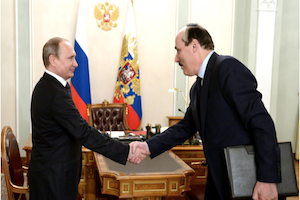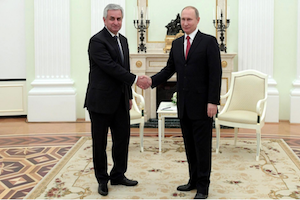Leadership Change in Dagestan
By Natalia Konarzewska
February 20, 2018, the CACI Analyst
In late September, Ramazan Abdulatipov announced his decision to step down from his post as the head of the Republic of Dagestan. Abdulatipov cited his age (71) as the main reason for his resignation, but the change of leadership in Dagestan should be viewed in the context of Russia’s upcoming presidential ballot scheduled for March 2018. Moscow habitually replaces heads of the federal subjects just before or after elections. Likely reasons behind Abdulatipov’s resignation are his poor performance and inability to tackle the republic’s most pressing problems. Multi-ethnic Dagestan is one of the Russian Federation’s most unstable subjects, continuously embattled by economic problems, clan rivalry and the activities of religious militants. On October 3, President Vladimir Putin appointed Vladimir Vasilyev, who does not represent any local ethnic group, to fill the vacant position.

Tensions Remain around Georgia's Breakaway Regions Nine Years After Five-Day War
By Natalia Konarzewska
October 26, 2017, the CACI Analyst
In August, Georgia commemorated the ninth anniversary of its five-day war with Russia over the breakaway regions of Abkhazia and South Ossetia and the 25th anniversary of the war in Abkhazia. Although years have passed since the hostilities, the conflicts remain unresolved while the political situation around the two de facto entities as well as Russia-Georgia relations remain tense. Russia’s President Vladimir Putin visited Abkhazia and reiterated Russia’s military support for the region. In the preceding months, Russia increased its military pressure on Georgia by conducting large-scale military exercises in South Ossetia and Abkhazia. In parallel, Russia continues the illegal demarcation of the so-called frontier between Georgian-controlled territory and the separatist regions, moving the occupation line further into Georgian territory.

The “North-South” transport corridor finally kicks off
By Fariz Ismailzade
September 26th, 2016, The CACI Analyst
The frequently discussed but always delayed “North-South” transport corridor was finally kicked off during a trilateral summit of three Presidents in Baku in August. It will bring major geopolitical changes to the region and further cement the growing ties between Russia, Azerbaijan and Iran. Coupled with the “East-West” transport corridor, Baku is set to become a transport hub of the greater Eurasia.
New agreements reached during Sargsyan's visit to Moscow
By Erik Davtyan
September 28th, the CACI Analyst
On September 7, Armenia’s President Serzh Sargsyan visited Moscow and met his counterpart Vladimir Putin. This meeting, which took place nearly two years after President Sargsyan declared Armenia’s decision to join the Russia-led Customs Union, is the fourth in this year. The first meeting in 2015 took place in April, when Putin attended the events dedicated to the commemoration of the Armenian Genocide Centennial. The second and third meetings took place in May and July when Sargsyan attended the events in Moscow dedicated to the 70th anniversary of the victory in the Great Patriotic War and then during the joint summit of BRICS, the Eurasian Economic Union (EEU) and SCO leaders in Ufa.



